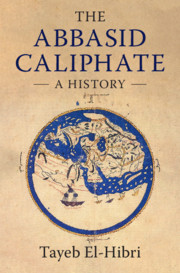
-
Select format
-
- Publisher:
- Cambridge University Press
- Publication date:
- April 2021
- April 2021
- ISBN:
- 9781316869567
- 9781107183247
- 9781316634394
- Dimensions:
- (228 x 152 mm)
- Weight & Pages:
- 0.7kg, 360 Pages
- Dimensions:
- (228 x 152 mm)
- Weight & Pages:
- 0.59kg, 360 Pages
You may already have access via personal or institutional login
Book description
The period of the Abbasid Caliphate (750–1258) has long been recognized as the formative period of Islamic civilization with its various achievements in the areas of science, literature, and culture. This history of the Abbasid Caliphate from its foundation in 750 and golden age under Harun al-Rashid to the conquest of Baghdad by the Mongols in 1258 examines the Caliphate as an empire and institution, and probes its influence over Islamic culture and society. Ranging widely to survey the entire five-century history of the Abbasid dynasty, Tayeb El-Hibri examines the resilience of the Caliphate as an institution, as a focal point of religious definitions, and as a source of legitimacy to various contemporary Islamic monarchies. The study revisits ideas of 'golden age' and 'decline' with a new reading, tries to separate Abbasid history from the myths of the Arabian Nights, and shows how the legacy of the caliphs continues to resonate in the modern world in direct and indirect ways.
Reviews
'The Abbasid Caliphate is an ambitious history of Abbasid rule that achieves its goal of narrative coherence over five centuries without losing sight of the complexity of its subject ... the book is intelligent, engaging, and often quietly humorous - the sort to appeal to researchers, general readers, and both graduate and undergraduate students ... Recommended.'
R. A. Miller Source: CHOICE
Contents
Metrics
Altmetric attention score
Full text views
Full text views help Loading metrics...
Loading metrics...
* Views captured on Cambridge Core between #date#. This data will be updated every 24 hours.
Usage data cannot currently be displayed.
Accessibility standard: Unknown
Why this information is here
This section outlines the accessibility features of this content - including support for screen readers, full keyboard navigation and high-contrast display options. This may not be relevant for you.
Accessibility Information
Accessibility compliance for the PDF of this book is currently unknown and may be updated in the future.


